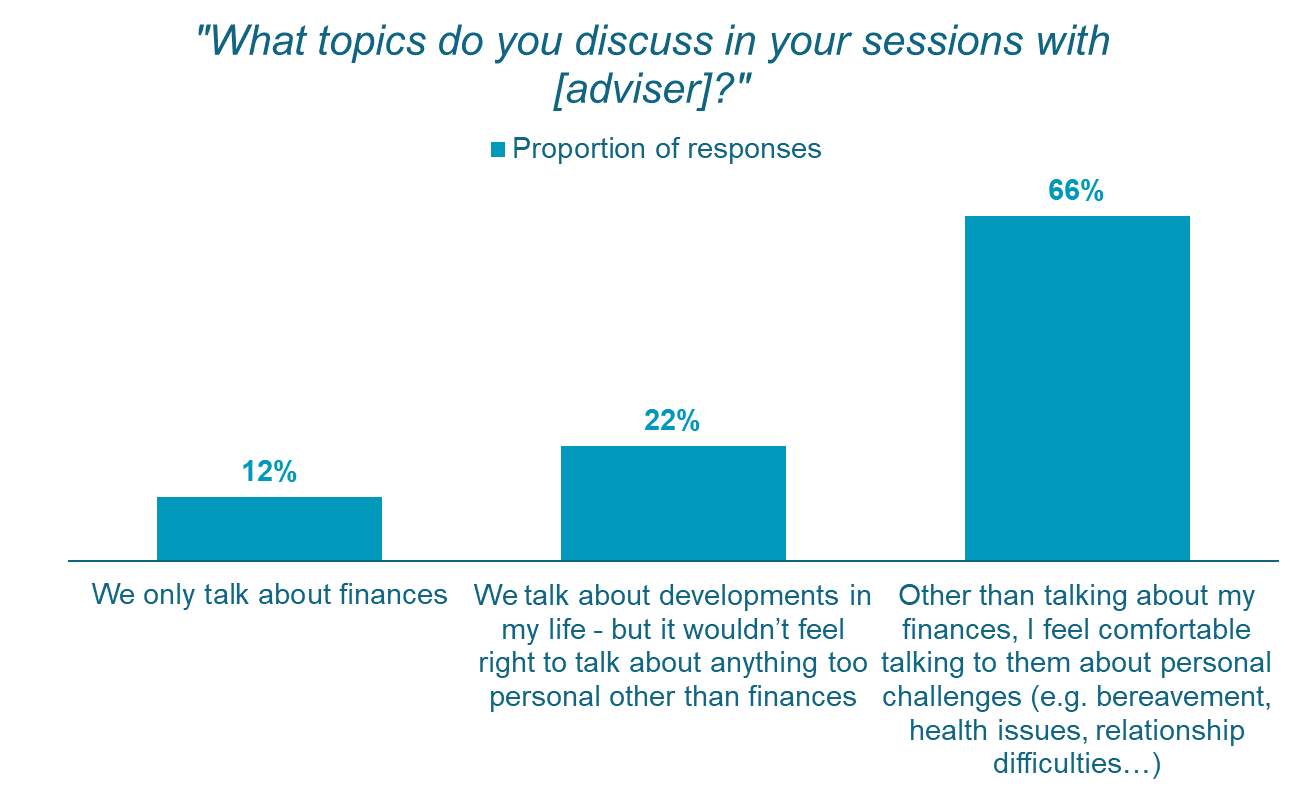Client Discusses Personal Challenges
Client Discusses Personal Challenges is a Driver of Elevation Goal 3: Safeguarding clients’ best interests, mitigating risk
Data based on responses to the following question, asked in the Verified Client review form
“What topics do you discuss in your sessions with [adviser]?”
Possible responses
We only talk about finances
We talk about developments in my life - but it wouldn’t feel right to talk about anything too personal other than finances
Other than talking about my finances, I feel comfortable talking to them about personal challenges (e.g. bereavement, health issues, relationship difficulties…)
Client Discusses Personal Challenges Score
Proportion of respondents answering “Other than talking about my finances, I feel comfortable talking to them about personal challenges (e.g. bereavement, health issues, relationship difficulties…)”
Distribution of responses to Client Discusses Personal Challenges
Our qualitative research with advisers indicated that between annual suitability assessments, the best way to discover whether something significant has changed in a client’s life, is for the client to volunteer this information. If the client doesn’t feel comfortable doing this, there is a risk that circumstances change, advisers’ recommendations are no longer suitable, and this is not picked up.
How to improve your score:
The importance of change
Keeping up to date. Make sure your client knows that their plan is based on their current circumstance and if this changes at any point, you may need to vary the plan. For this reason, it’s important that they let you know, no matter how minor they may think the change is.
Notifying you. Ensure your clients are clear on how to tell you about changes. Should they call your mobile, call the office, or just update their details on their client portal? Being clear on how your clients should contact you takes away a barrier by stopping them wondering how best to get in touch.
Starting your conversations
Establish Rapport. Rapport extends beyond small-talk. Finding genuine common ground to talk about which connects you to your client. In each interaction with your client, spend time talking about what’s important to them. This could be their family, a recent important event or how their football team did at the weekend. The key is to make them feel that your relationship is more than transactional.
Beware starting your conversation with money. This can be an immediate turn off for your prospective clients and risks a superficial conversation preventing you from understanding your client’s real motivation.
Sincerity is key. Ask your client how they are and be genuinely interested in their response. Asking how someone is and then saying “great, so let’s get on with things” shows your question was insincere, killing rapport.
Make it personal
Relevant to them. If you’ve established good rapport, your client will tell you about what’s going on in their life. You can use this to frame their progress in line with their life goals.
Events and milestones. Make a note of key events (ideally in your CRM system) and ask your client about them the next time you speak to them.
Touching base. Set a reminder/diary note for you to contact them around special events (retirement, child’s graduation, amazing holiday). Give them a call specifically to ask about the event – don’t talk about business at all in the call.
Active listening. Being conscious of your behaviour and body language when your client is talking. Active listening is a great way to show your client that you’re interested in what they have to say.
Be honest, be you
Be authentic. It’s easy to try and put on a “work persona” when with clients. Whilst this may come across very professional, it’s not you, and people buy into people. Be authentically yourself in all your engagements.
Own mistakes. Don’t try to cover them up. If you’ve forgotten to ask for something, it’s much better to be honest. People connect more with others who are able to show vulnerability so by being honest, you’re likely to build a deeper relationship with your client.
Be Open. Share some information about your life, including any challenges. We’re not talking about a full therapy session, however sharing shows you to be authentic. If your client feels that you’re being open about your life, they’ll feel more comfortable being open about theirs.
It is critical to reinforce the importance of having up to date information, and that any changes in circumstances, no matter how small, may need an adjustment in the plan. In order to fully mitigate the risk profile for your client, you need them to keep you up to date with their circumstances.
By establishing a strong relationship with your client, you can encourage an open dialogue, helping you build trust and together mitigate their risk profile.

